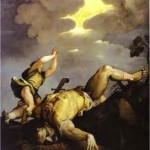How to reconcile them? It’s a bogus problem.
by Fr. Patrick Henry Reardon
 Not long ago, in a Q&A session following a lecture in a distant city, someone inquired of me,
Not long ago, in a Q&A session following a lecture in a distant city, someone inquired of me,
“How do you reconcile children to the violent stories found in the Old Testament?”
My response went along these lines:
I believe this is a bogus problem. In truth, I have never met a child disturbed by violence in literature. In my experience, on the contrary, children take narrative barbarity very much in stride, whether in the Bible, or the Brothers Grimm, or anywhere else.
For example, children expect a bad wolf in a good story to fall to the sword or the ax — they depend on it — whether on the last page of ‘Little Red Riding Hood’ or at the end of The Lion, the Witch, and the Wardrobe.
When I was a boy, our book of ‘Bible Stories’ portrayed young David holding up, by its hair, the gory and justly severed head of Goliath. If memory serves, I found the picture reassuring. That Philistine’s bloody fate bothered me no more than the demise of the giant at the end of “Jack and the Beanstalk.” After all, slay giants is what proper little boys do.
In short, I think the violence in children’s literature — including the Bible — will probably cause no harm to a normal child. It will more likely offend a prissy parent.
My childhood’s sympathetic response to literary violence has lasted a long time, and I will doubtless die with it. It requires considerable effort for me to take seriously what some folks regard as major stumbling blocks in Holy Scripture: accounts of murder and incest, narratives of the earth opening up to devour the wicked, commands to seize the property of infidels, psalms that curse them, and divine injunctions to put them to the sword — to slay innocent children along with their parents.
I have sometimes wondered why I don’t find these stories personally distressing, and I suspect the answer is this: I don’t really have — as something of my own — a moral sense apart from Holy Scripture. My moral formation is derived mainly from Sacred Literature.
In other words, I have no independent place in my mind, on which to stand and take issue with a single syllable of what the Bible asserts. Everything I know about right and wrong comes from the canonical Scriptures. If these have shaped my whole moral sense, how can that moral sense turn around and pass judgment on them?
On the other hand, we all know the Bible is a book of history, and the ongoing moral development of the People of God is an important component of that history. Now, the very notion of a moral development implies some measure of imperfection in the earlier stages.
For this reason it is the occasion of neither surprise nor distress when Samson fails to attain the moral stature of Stephen. The moral disparity between Joshua and John is exactly what I should expect, if I ponder the historical nature of biblical revelation. I think few serious readers of the Old Testament books will disagree with Vatican II that
“they contain things imperfect and temporary” (imperfecta et temporaria — Dei Verbum 15).
I liken those darker parts of the Hebrew Scriptures to shadows cast on the earth by the earliest appearance of the light. The Latin Psalter says to the Lord,
“Thou hast crafted the dawning and the sun” — Tu fabricatus es auroram et solem (Psalm 73:16).
We observe the order: Dawn-then-sun. Strictly speaking there could be no dawn unless the sun already existed. The Psalmist’s sequence of dawn-then-sun describes how things appear, not how they exist. The early light comes to us on a curve and then an angle. The daylight is presented to us in stages, the full sun itself being the final stage.
The angularity of the early morning light seems to hurl long lines of darkness on the earth. This is only an impression, nonetheless. What sort of logic would blame the light for the shadows? Who among us does not recognize that the shadows were already there, long before the light appeared? Indeed, it is the gradually emerging light that reveals the dark places. These shadows, they shorten, bit-by-bit, and they will vanish in the fullness of time, when the sun increases to full strength.
I am no more offended, then, by the tenebrous parts of the Bible than by the shades thrown forward by the slanting daylight. To me, the dark recesses of . . . say, the Book of Joshua resemble the somber drama of the Grand Canyon, as myriad silhouettes take shape down its walls, just before the sunrise.
Fr. Patrick Henry Reardon is pastor of All Saints Antiochian Orthodox Church in Chicago, Illinois, and a Senior Editor of Touchstone: A Journal of Mere Christianity.
